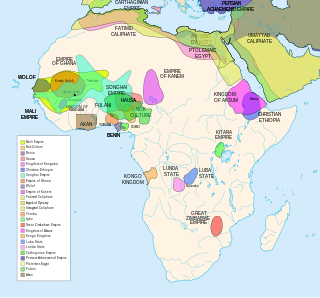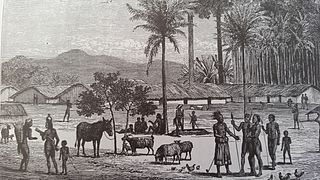Related Research Articles

Corpus Christi College is a constituent college of the University of Cambridge. From the late 14th century to the early 19th century it was also commonly known as St Benet's College.

The Scramble for Africa was the conquest and colonisation of most of Africa by seven Western European powers driven by the Second Industrial Revolution during the era of "New Imperialism" (1833–1914):Belgium,France,Germany,Great Britain,Italy,Portugal and Spain.

Tippu Tip,or Tippu Tib,real name Ḥamad ibn Muḥammad ibn Jumʿah ibn Rajab ibn Muḥammad ibn Saʿīd al Murjabī,was an Afro-Omani ivory and slave owner and trader,explorer,governor and plantation owner. He worked for a succession of sultans of Zanzibar and was the Sultan of Uterera,a short-lived state in Kasongo,Maniema ruled by himself and his son Sefu who was an emir of the local WaManyema.
Colonization of the Congo Basin refers to the European colonization of the Congo Basin of tropical Africa. It was the last part of the continent to be colonized. By the end of the 19th century,the Basin had been carved up by European colonial powers,into the Congo Free State,the French Congo and the Portuguese Congo.

The Luba people or Baluba are a Bantu ethno-linguistic group indigenous to the south-central region of the Democratic Republic of the Congo. The majority of them live in this country,residing mainly in Katanga,Kasaï,Kasaï-Oriental,Kasaï-Central,Lomami and Maniema. The Baluba consist of many sub-groups or clans.

Manyema (WaManyema) (Una-Ma-Nyema,eaters of flesh) are a Bantu ethnic group,described in the past as powerful and warlike,in the African Great Lakes region of Eastern Africa and Central Africa.

The history of slavery spans many cultures,nationalities,and religions from ancient times to the present day. Likewise,its victims have come from many different ethnicities and religious groups. The social,economic,and legal positions of slaves have differed vastly in different systems of slavery in different times and places.

Slavery has historically been widespread in Africa. Systems of servitude and slavery were once commonplace in parts of Africa,as they were in much of the rest of the ancient and medieval world. When the trans-Saharan slave trade,Red Sea slave trade,Indian Ocean slave trade and Atlantic slave trade began,many of the pre-existing local African slave systems began supplying captives for slave markets outside Africa. Slavery in contemporary Africa is still practised despite it being illegal.
Retford Oaks Academy is a coeducational secondary school and sixth form located in the market town of Retford,Nottinghamshire,England,situated in the district of Bassetlaw.
Sir Archibald Duncan Wilson was a British diplomat and Master of Corpus Christi College,Cambridge.

The Congo Arab war or Arab war was a colonial war fought between the Congo Free State and Arab-Swahili warlords associated with the Arab slave trade in the eastern regions of the Congo basin between 1892 and 1894.
Muhammad bin Khalfan bin Khamis al-Barwani,commonly known as Rumaliza,was an Arab trader of slaves and ivory,active in Central and East Africa in the last part of the nineteenth century. He was a member of the Arabian Barwani tribe. With the help of Tippu Tip he became Sultan of Ujiji. At one time he dominated the trade of Tanganyika,before being defeated by Belgian forces under Baron Francis Dhanis in January 1894.

The Omani Empire was a maritime empire,vying with Portugal and Britain for trade and influence in the Persian Gulf and Indian Ocean. After rising as a regional player in the 18th century,the empire at its peak in the 19th century saw its influence or control extend across the Strait of Hormuz to modern-day Iran and Pakistan,and as far south as Cape Delgado. After the death of Said bin Sultan in 1856 the empire was divided between his sons into two sultanates,an African section ruled by Majid bin Said and an Asian section ruled by Thuwaini bin Said.

Legal chattel slavery existed in the area which was later to become Oman from antiquity until the 1970s. Oman was united with Zanzibar from the 1690s until 1856,and was a significant center of the Indian Ocean slave trade from Zanzibar in East Africa to the Arabian Peninsula and Iran,a central hub of the regional slave trade,which constituted a large part of its economy.

The Sultanate of Utetera (1860–1887),also referred as Tippu Tip's state,was one of the Arab sultanates established in eastern Africa. It was a 19th century short-lived state ruled by the infamous Swahili slave trader Tippu Tip and his son Sefu. The capital of the state was the town of Kasongo,located in modern Maniema Province,Democratic Republic of the Congo. Tippu Tip's controlled territory reached as far to eastern Kasai and to Aruwimi Basin in the west.
The history of black people in Cambridge,UK cannot easily be separated from the history of Cambridge University. The university has attracted students from Africa and the African diaspora to the town of Cambridge for more than two centuries. Several notable black people had a Cambridge association in the eighteenth and nineteenth centuries,and at the end of the eighteenth century Cambridge became a centre of abolitionist sentiment. From the end of the nineteenth century the university started to admit black students in larger numbers. In recent decades,however,the relatively low number of black students admitted to the university has become a topic of media comment and public concern.

Slavery existed in Morocco since antiquity until the 20th-century. Morocco was a center of the Trans-Saharan slave trade route of enslaved Black Africans from sub-Saharan Africa until the 20th-century,as well as a center of the Barbary slave trade of Europeans captured by the Barbary pirates until the 19th-century. The open slave trade was finally suppressed in Morocco in the 1920s. The haratin and the gnawa have been referred to as descendants of former slaves.

Slavery existed in the Sultanate of Zanzibar until 1909. Slavery and slave trade existed in the Zanzibar Archipelago for at least a thousand years. When clove and coconut plantations became a big industry on the islands,domestic slavery expanded to a point where two thirds of the populations were slaves. Zanzibar was internationally known as a major player in the Indian Ocean slave trade,where slaves from the Swahili coast of Eastern Africa were trafficked across the Indian Ocean to Oman in the Arabian Peninsula during the Zanzibar slave trade.
Afro-Omanis are Omani people of African Zanj heritage. Most live in the coastal cities of Oman,with many speaking Arabic and adhering to Islam. Their origins date back to the time of the Arab slave trade and era Slavery in Oman,and when Zanzibar was a part of the Omani Empire.
References
- ↑ [ dead link ]
- ↑ "Her Majesty's Ambassador". The National Archives. Archived from the original on 10 October 2006. Retrieved 22 July 2022.
- ↑ Announcement of new Master for Corpus Christi College (3 June 2008) University of Cambridge
- 1 2 Mastership Announcement Corpus Christi College
- ↑ Alston, Robert; Laing, Stuart (2017). Unshook Till the End of Time: A History of Relations Between Britain & Oman 1650 - 1970. Gilgamesh Publishing. ISBN 978-1-908531-76-6.
- ↑ Heard, David (2 September 2014). "Robert Alston and Stuart Laing. Unshook till the End of Time: A History of Relations between Britain & Oman 1650-1970 (Book Review)". Asian Affairs . 45 (3): 503–505. doi:10.1080/03068374.2014.953881. S2CID 162202852.
- ↑ Cambridge University Reporter No 6307, Vol cxliii No 30 (15 May 2013)
- ↑ Factors in the decisions by the sultans of Muscat and Zanzibar to end the slave trade and slavery in their dominions, 1820-1900 / Stuart Laing : University of Cambridge. Faculty of Asian and Middle Eastern Studies, 2012.
- ↑ Laing, Stuart (2017). Tippu Tip: Ivory, Slavery and Discovery in the Scramble for Africa. Medina Publishing. ISBN 978-1-911487-05-0.
- ↑ Mathews, Nathaniel (March 2019). "The Life of Tippu Tip. Tippu Tip: Ivory, Slavery, and Discovery in the Scramble for Africa. By Stuart Laing. (Book Review)". The Journal of African History . 60 (1): 121–122. doi:10.1017/S0021853719000070. ISSN 0021-8537. LCCN 63005723. OCLC 1039207112. S2CID 181896696.
- ↑ "Mr Stuart Laing, MA MPhil". Corpus Christi College. 1 October 2008. Archived from the original on 26 November 2016. Retrieved 25 November 2016.